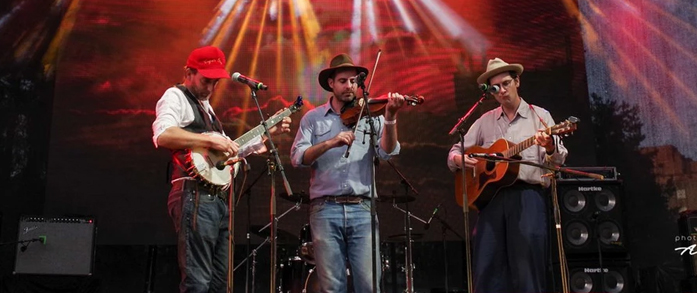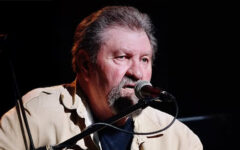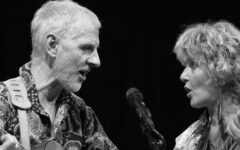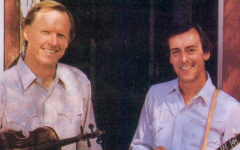
Interstate Express in Lithuania – photo by Arkadiy Krivonos
Interstate Express could be considered an international ensemble by any and all definitions. Currently based in Berlin, the group consists of fiddler and singer Craig Judelman, banjo player Joe Buirski, and guitarist/vocalist Jack B. Latimer.
Judelman, who’s originally from Seattle, Washington, is the leader and founder of the band. He said he became immersed in his hometown’s old-time and bluegrass scene when he was young. “I would go to the Folklife Festival and it was there that I even earned a few bucks by putting out my fiddle case and playing classical music,” he recalls. “But I also heard all this interesting folk music when I was there that was much more exciting to me than the things I learned in my Suzuki lessons. So while I loved the bluegrass fiddle I encountered in my early teens, it felt a bit foreign to me — or me to it I guess.”
While in college, Judelman met his former bandmate with a group called the The Dust Busters, Walker Shepherd. “He was already into all this weird mountain music, and the sounds of Roscoe Holcomb and Dock Boggs started to really excite me. I quickly fell in love with old time music, and then bluegrass as well, and when I graduated and moved to Brooklyn, it kinda took over my life. Having some amazing mentors in Brooklyn really helped. Then we started traveling a lot down to Appalachia and the lower midwest, meeting traditional musicians and going to fiddlers conventions. I was totally blown away by this whole culture, and of course the music.”
Judelman eventually ended up meeting a girl who lived in Berlin and he relocated with her there in 2016.
“I had met our British banjo player while previously on tour in the UK, and we reconnected at a friends’ wedding in central Tennessee, where I proposed starting a band together,” he recalls. “He had been playing old time music and bluegrass for years, and was pretty well connected in the UK, so it was a great way to jump into the scene over there. We picked up Jack B. Latimer, our guitarist, when I moved to Berlin. A few different friends said he was the guy I had to meet, so we actually arranged to do a gig together before I even got over there. We met for a rehearsal and immediately became fast friends, bonding over a love of old American fiddle music. The band basically just took off from there and has been growing ever since. Unfortunately, since we live in different countries, one of us has kids, and we’re all involved in a few other projects, we don’t get to play quite as often as we’d like to.”
Nevertheless, Judelman said the band has been building a following in the UK for quite awhile, as well as at festivals around the rest of Europe. “We’re slowly figuring out how to navigate the German music world,” he continues. “We were kinda hitting our stride when the pandemic hit. A new album, Goin’ Up to Hamburg, that was released on June 2, was meant to come out in 2020, but after COVID hit, it just seemed pointless to put out a record and never tour behind it, so it ended up sitting on the back burner for a while. Thank goodness we’re moving past all that and finally have this record coming out. Hopefully we’ll be touring it quite a bit in the next year. We’re already working on the next one.”
Ultimately, the Interstate Express Band stays true to tradition, and often blends sounds and styles in order to arrive at their own unique approach.
“We really love the older archaic styles and recordings, but also really appreciate the many different iterations of this tradition because we see them as parts of a whole, even if they have different names,” Judelman continues. “We love the music that happens at the boundaries, like J.E. Mainer’s Mountaineers or Fiddlin’ Arthur Smith. After spending years in somewhat snobby and exclusive old time circles, we’ve come to really appreciate any tune that’s played well by a band that’s really locked in. We play a mix of old time fiddle breakdowns, early country and workers’ songs, blues and ragtime, rocking bluegrass tunes, and even a few original fiddle tunes. As the bandleader and person in the band with the most experience in this music, my style and interests probably have the most effect on what we do. I love the phrasing, articulation, and individuality of older old time fiddle recordings, but I also play a lot of variations, and enjoy sometimes getting swept up in the energy and wandering a bit away from the original melody, which sometimes takes the band to an almost psychedelic space in our live shows. That’s especially true on bigger festival stages. But we all also really just love a well-crafted song and the great bluegrass harmony singers. Since we play for a lot of audiences that aren’t so familiar with the music, we try to give a sense of the rich variety of American fiddle music — from old time to ballads, ragtime to bluegrass.”
That said, the band’s commitment goes beyond the sounds themselves. “We are all quite devoted to the culture surrounding this music, and to using it to build community and help people appreciate their own culture,” Judelman explained. “In the UK, we play for dances that connect with American square and contra dancing. Our banjo player calls the dances and also usually does a bit of flatfooting and clogging in our shows. He has been building a scene around this music since about 2005, putting on shows, dances, workshops, and festivals, and such. His group would get as many as 500 people out for a square dance on a Saturday night in London. They found ways of making it more accessible, like ‘remix reeling’ where they make electronic remixes of old time fiddle tunes, and doing more of what we would call contra dances in the States. They often originate from dances from those parts, and are a bit easier to learn. Playing real uptempo high energy old time music for the dances encourages people to let loose.”
Judelman cites John Cohen and The New Lost City Ramblers, The Skillet Lickers, Fiddling Arthur Smith, Doc Roberts, Uncle Dave Macon, Stanley Brothers, J.E. Mainer’s Mountaineers, Art Stamper, and Hazel and Alice, as prime influences. ‘When I first moved to Brooklyn, we would go to these Thanksgiving picking parties with Peter Stampfel and John Cohen and various other folks,” he recalls. “Even though the two of them had quite different approaches to the music, they were both really respectful and managed to make music together in a genuine way. It took me some years to fully appreciate how rare it is for folks to really achieve something in a certain style, but not become dogmatic about a way of playing.”
Indeed, the music that make is part of a bigger mission.
“That’s something we really try to bring to the music we make in Interstate Express,” Judelman says. “We’re not scared to let an old-time tune turn a bit bluegrassy, or even go further afield if the moment calls for it. There seem to be a lot of bands that try to make some kind of fusion because they’re not totally in love with the raw sound of traditional music, or they don’t believe in its power. I think the fear of that kinda pushed us to a pretty traditionalist approach at first.”
He also said that because the band’s new album represents their first full-length record, they decided to emphasize that traditional old time approach because that’s where they feel most rooted. “In our live shows, anything can happen,” Judelman muses. “We’ve worked hard to find a sound that we can make work in a house concert or acoustic folk club, or on a big festival stage. It’s taken some years and a lot of thoughtful song choices, but judging from our last few shows, I think we’ve really gotten there.”
In fact, their efforts have paid off. They’ve toured and performed at numerous festivals throughout Europe and the UK, along with pub gigs, village halls, and folk clubs throughout England, Germany, and other parts of Europe.
“There’s very little chance most of our audiences have heard early country music recordings, let along bluegrass or old-time music,” Judelman explains. “Sometimes at our concerts, I ask if anyone’s heard of Johnny Cash and almost everyone always responds yes. But if I then ask, ‘Who’s heard of Hank Williams, Bill Monroe, Jimmie Rodgers, etc.’ It’s not very often I get much of a response. However I am always amazed that occasionally some die-hard American folk fan will turn up and make a special request.”
Nevertheless, he does believe the band is making an impact. “I think it’s quite meaningful for people back home to know that their music is appreciated everywhere, from London and Berlin music venues to small villages in Romania or Lithuania,” Judelman reflects. “For us it’s just an honor to be a part of the long chain of musicians who have made this music what it is, and to get the opportunity to share their legacies with new audiences.”







